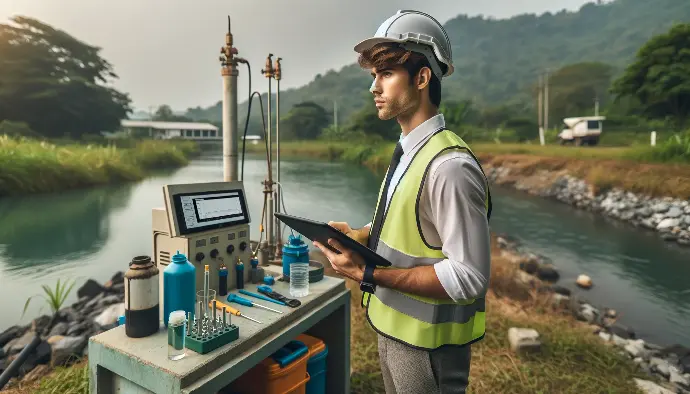Stakeholders
In the process of obtaining a No Objection Certificate (NOC) for groundwater extraction from the Central Ground Water Board (CGWB), several key stakeholders play vital roles. Understanding these stakeholders is essential for ensuring effective compliance and sustainable groundwater management:
- Industries: Manufacturing units, processing plants, and factories that rely on substantial groundwater for their operations. Compliance ensures they can legally and sustainably continue their activities.
- Infrastructure Developers: Companies involved in constructing residential complexes, commercial buildings, and large-scale infrastructure projects need to secure a groundwater NOC to legally extract water for construction and operational purposes.
- Mining Companies: Mining operations, which require significant amounts of groundwater, must comply with CGWB guidelines to prevent environmental degradation and ensure sustainable extraction practices.
- Commercial Establishments: Hotels, resorts, golf courses, and other commercial entities dependent on groundwater must adhere to CGWB regulations to ensure responsible water use.
- Regulatory Authorities: The Central Ground Water Authority (CGWA) and respective State Ground Water Authorities are responsible for issuing and regulating NOCs, ensuring compliance with both national and state-specific guidelines.
- Environmental Consultants: Professionals who assist in preparing the necessary hydrogeological reports and other documentation required for NOC applications.
- Local Communities: Residents and local governing bodies who are affected by groundwater extraction and play a role in monitoring and reporting unsustainable practices.
Effective engagement with these stakeholders ensures compliance with CGWB guidelines, promoting sustainable groundwater management and legal adherence.
Compliance Requirements
Obtaining and maintaining a groundwater NOC from CGWB involves adhering to several compliance requirements. These requirements ensure that groundwater extraction is conducted sustainably and legally:
- NOC Application: Submit a comprehensive application to the CGWA or the respective State Ground Water Authority, detailing the project and intended groundwater use.
- Hydrogeological Report: Prepare and submit a detailed hydrogeological report assessing groundwater conditions, availability, and the potential impact of extraction.
- Rainwater Harvesting: Implement rainwater harvesting systems to recharge groundwater, as mandated by CGWB guidelines.
- Digital Water Flow Meters: Install tamper-proof digital water flow meters to monitor and report groundwater usage accurately.
- Environmental Clearance: Obtain all necessary environmental clearances from relevant authorities to ensure the project complies with environmental protection norms.
- Annual Compliance Reports: Submit regular compliance reports, including water usage data and water quality assessments, to CGWA.
- Affidavits and Declarations: Provide notarized affidavits regarding the non-availability of adequate water supply from local sources and other required declarations.
Adhering to these compliance requirements is essential for maintaining the validity of the groundwater NOC and ensuring sustainable groundwater management.
How to Comply
Ensuring compliance with CGWB guidelines for groundwater extraction involves several crucial steps. Here’s how NOC holders can comply effectively:
- Register Online: Create an account on the CGWA portal to initiate the application process.
- Prepare Documentation: Gather all required documents, including hydrogeological reports, project plans, environmental clearances, and other necessary affidavits.
- Submit Application: Complete and submit the online application form on the CGWA portal, along with all supporting documents and the applicable fees.
- Install Water Flow Meters: Ensure that tamper-proof digital water flow meters are installed and functional to accurately monitor groundwater usage.
- Implement Rainwater Harvesting: Set up rainwater harvesting systems as per the guidelines and submit the plan to CGWA. These systems help in replenishing groundwater and demonstrating a commitment to sustainable water management.
- Site Inspection: Cooperate with CGWA officials during site inspections to verify compliance with the guidelines. Inspections may involve assessing the accuracy of submitted information and the implementation of water conservation measures.
- Report Submission: Regularly submit compliance reports, water usage data, and water quality assessments to CGWA. These reports help monitor ongoing compliance with NOC conditions.
- Renewal: Apply for NOC renewal before the expiration date, ensuring all conditions are met and reports are up to date. Renewing the NOC involves demonstrating continued compliance with CGWB guidelines.
Following these steps ensures that NOC holders comply with CGWB guidelines, promoting sustainable groundwater management and legal compliance.
Time Limits and Due Dates
Meeting specified time limits and due dates is crucial for maintaining compliance with CGWB guidelines for groundwater extraction:
- Application Processing: The typical processing time for a groundwater NOC is approximately 90 days from the date of application submission.
- Report Submission: Annual compliance reports and water quality assessments must be submitted by the end of the financial year to CGWA.
- NOC Renewal: Renewal applications should be submitted at least 90 days before the NOC expiry date to ensure continued compliance.
- Installation of Meters: Digital water flow meters must be installed within 30 days of receiving the NOC.
- Rainwater Harvesting Implementation: Rainwater harvesting systems should be operational within six months of NOC issuance.
Adhering to these deadlines is essential for maintaining compliance and avoiding legal penalties. Understanding and meeting these time limits ensures sustainable groundwater management and compliance with CGWB regulations.
Role of Consultant
The process of obtaining a No Objection Certificate (NOC) for groundwater extraction from the Central Ground Water Board (CGWB) can be complex and demanding. Consultants play a pivotal role in guiding NOC seekers through this process, ensuring compliance with all regulatory requirements. Here’s a detailed look at the role of a consultant in this context:
1. Expert Guidance and Consultation
Consultants bring specialized knowledge and expertise in groundwater management and regulatory compliance. They provide crucial guidance to NOC seekers, helping them understand the requirements and processes involved in obtaining a groundwater NOC. This includes explaining the significance of the NOC, the legal norms, and the specific guidelines issued by the CGWA.
2. Hydrogeological Studies and Reports
One of the primary responsibilities of a consultant is to conduct detailed hydrogeological studies. These studies assess the groundwater conditions, availability, and potential impacts of extraction on the local water table and environment. Consultants prepare comprehensive hydrogeological reports that form a critical part of the NOC application. These reports include data on water levels, aquifer properties, and sustainable yield calculations.
3. Documentation and Application Preparation
Consultants assist NOC seekers in preparing all necessary documentation for the NOC application. This includes compiling project details, environmental clearances, rainwater harvesting plans, and affidavits. Consultants ensure that all documents meet the regulatory standards and are correctly formatted, significantly reducing the chances of application rejection.
4. Application Submission and Follow-up
Consultants manage the entire application submission process on behalf of the NOC seekers. They complete the online application on the CGWA portal, upload the required documents, and ensure timely payment of applicable fees. Consultants also handle any follow-up communication with CGWA, addressing queries and providing additional information as needed to expedite the approval process.
5. Compliance Monitoring and Reporting
Post-approval, consultants play a critical role in ensuring ongoing compliance with NOC conditions. This includes setting up systems for regular monitoring of groundwater extraction using digital water flow meters, implementing rainwater harvesting systems, and preparing annual compliance reports. Consultants help NOC holders maintain accurate records and submit required reports to CGWA, ensuring continued compliance and avoiding legal penalties.
6. Site Inspections and Audits
Consultants assist in preparing for site inspections conducted by CGWA officials. They ensure that all conditions specified in the NOC are met and that the necessary infrastructure, such as water flow meters and rainwater harvesting systems, is in place and functional. Consultants may also conduct periodic audits to verify compliance and recommend corrective actions if needed.
7. Renewal and Extension Applications
When the NOC nears its expiration, consultants guide NOC holders through the renewal process. This involves preparing updated documentation, submitting renewal applications, and ensuring that all compliance conditions have been met. Consultants also assist in applying for extensions if the project faces delays or changes in scope.
8. Advisory on Legal and Environmental Matters
Consultants provide ongoing advisory services on legal and environmental matters related to groundwater extraction. They keep NOC seekers informed about any changes in regulations, new guidelines issued by CGWA, and best practices for sustainable groundwater management. This proactive approach helps NOC holders stay ahead of regulatory requirements and adopt environmentally responsible practices.
9. Training and Capacity Building
To ensure long-term compliance and sustainable practices, consultants may offer training and capacity-building programs for the staff of NOC seekers. These programs cover topics such as groundwater monitoring techniques, data recording and reporting, and maintenance of water conservation systems.
10. Liaison with Regulatory Authorities
Effective liaison with regulatory authorities is crucial for smooth processing of NOC applications and resolving any issues that may arise. Consultants act as intermediaries between NOC seekers and regulatory bodies, facilitating clear communication and timely resolution of queries and compliance issues.
The role of a consultant in obtaining and maintaining a groundwater NOC from CGWB is invaluable. They provide expert guidance, ensure accurate documentation, facilitate compliance with regulatory requirements, and support NOC seekers throughout the entire process. By engaging a consultant, NOC seekers can navigate the complexities of groundwater regulations with confidence, ensuring legal compliance and promoting sustainable groundwater management.
FAQs
A No Objection Certificate (NOC) for
groundwater extraction is an official approval issued by the Central Ground
Water Board (CGWB) that allows industries, infrastructure projects, and
commercial establishments to extract groundwater legally. This certificate
ensures that groundwater extraction is done sustainably and in compliance with
Indian legal norms.
Industries, infrastructure developers, mining
companies, and commercial establishments that require significant amounts of
groundwater for their operations must obtain a groundwater NOC. This includes
manufacturing units, construction projects, hotels, resorts, and other entities
that depend on groundwater.
To apply for a groundwater NOC from CGWA, you
must register and submit an online application through the CGWA portal. The
application requires detailed project information, supporting documents, and a
hydrogeological report. The process also involves paying an application fee and
possibly undergoing a site inspection.
The required documents include a
hydrogeological report, a notarized affidavit of non-availability of adequate
water supply from local authorities, detailed project plans, a rainwater
harvesting plan, environmental clearances, land ownership proof, a water use
plan, and a plan for installing digital water flow meters.
The fee structure for obtaining a groundwater
NOC varies based on the type and scale of the project and the category of the
assessment unit. Fees are updated periodically by CGWA and are payable online
during the application process.
The typical processing time for a groundwater
NOC is approximately 90 days from the date of application submission. This
period includes document verification, application review, and site inspection
if necessary.
The key legal provisions include the
Environment (Protection) Act, 1986, directives from the Supreme Court, orders
from the National Green Tribunal (NGT), CGWA guidelines, and state-specific
groundwater regulations. These laws ensure sustainable groundwater management
and compliance with environmental norms.
No, the application for a groundwater NOC must
be submitted online through the CGWA portal. This digital process ensures
transparency, efficiency, and ease of access for all applicants.
Failure to obtain a groundwater NOC can result
in legal penalties, fines, and potential shutdown of operations. Non-compliance
with groundwater regulations can lead to severe environmental and legal
consequences, including hefty fines and environmental compensation charges.
After obtaining a NOC, groundwater usage is
monitored through the installation of digital water flow meters. These meters
ensure accurate reporting of groundwater extraction. Regular compliance reports
must be submitted to CGWA, and periodic site inspections may be conducted to
verify adherence to NOC conditions.

